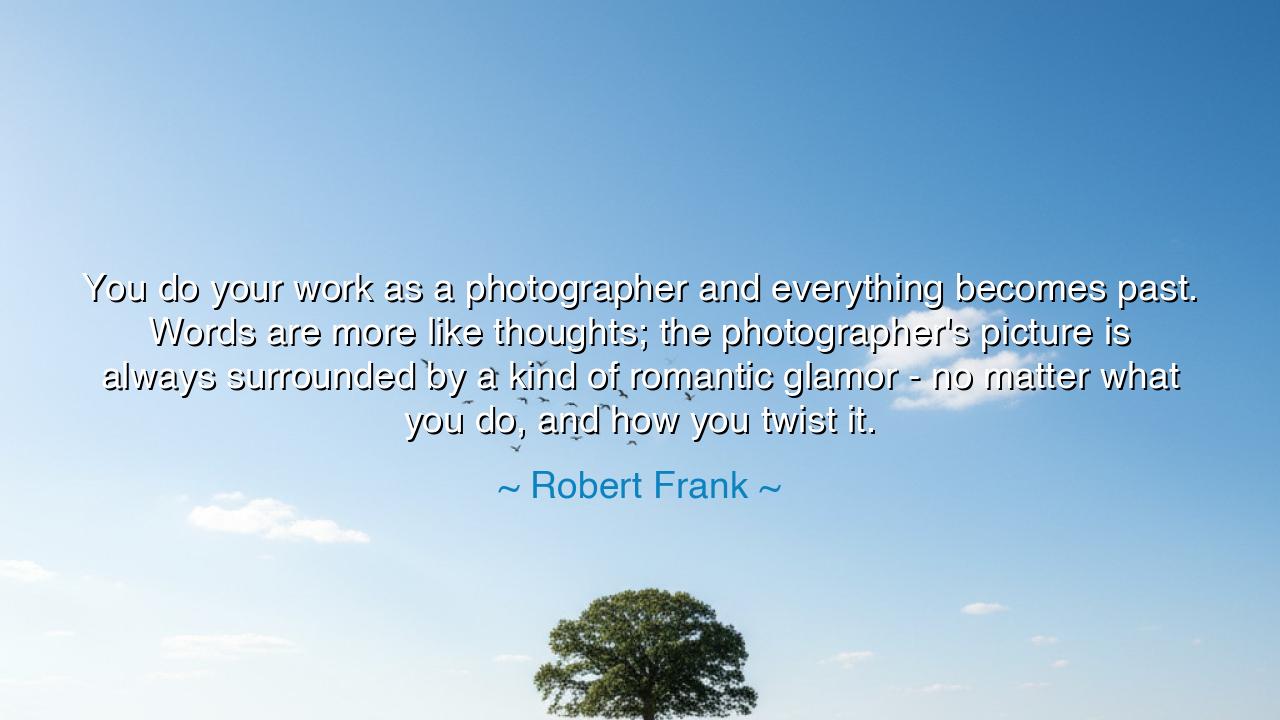
You do your work as a photographer and everything becomes past.
You do your work as a photographer and everything becomes past. Words are more like thoughts; the photographer's picture is always surrounded by a kind of romantic glamor - no matter what you do, and how you twist it.






“You do your work as a photographer and everything becomes past. Words are more like thoughts; the photographer’s picture is always surrounded by a kind of romantic glamor—no matter what you do, and how you twist it.” Thus spoke Robert Frank, the great chronicler of America’s restless soul. His words do not merely concern the art of photography, but the deeper mystery of how humans grasp the fleeting nature of time. For to hold a camera is to seize what vanishes, to trap a moment that, once passed, cannot be lived again.
In his saying lies a profound contrast: words are like thoughts, swift and invisible, moving in the silence of the mind. They exist in the realm of ideas, carrying meaning but not substance. A word may be spoken, forgotten, or transformed, but the image, once taken, is a relic. It stands not as thought, but as captured reality. Yet even this captured truth becomes strange, for the moment is gone, and what remains is touched with memory, nostalgia, and that mysterious veil Frank calls romantic glamor.
The ancients knew this paradox well, though their tools were stone and pigment rather than camera and lens. Recall the cave painters of Lascaux, who etched bison and deer upon rock. Those hunters knew that their drawings could never equal the living movement of the beasts, yet they sought to fix a memory, to honor what had passed. The hunt was gone, but the picture remained, glowing with that same glamour—the aura of something both lost and eternal.
Robert Frank himself bore witness to this in his book The Americans. His lens captured diners in roadside cafés, black funeral processions, cowboys at ease, and weary travelers upon the bus. In the moment he pressed the shutter, the people lived, breathed, and moved—but as the photograph was born, the moment became past. And when others gazed upon it, they did not merely see what happened—they felt it, cloaked in a strange beauty that comes only from distance. This is the eternal charm and sorrow of photography: it preserves, yet it reminds us that all things are fleeting.
There is a lesson here for all who live. Do not cling too tightly to the present, for it is gone in a breath. And yet, do not despair, for even what passes is not lost—it transforms into memory, into art, into the stories and images that guide those who come after us. Just as words carry our thoughts forward, so too do images carry the soul of moments we cannot hold. Both are sacred; both are vessels of the human spirit.
The Roman philosopher Seneca wrote that life is not short, but we waste much of it. Photography, like writing, teaches us this truth. When the shutter closes, the instant is gone, and we are reminded of our duty: to live fully within the now, so that what becomes the past is worthy of remembrance. The romantic glamor of an image is not in its perfection, but in its testimony that we dared to live, dared to feel, dared to pause and see.
Therefore, let this teaching guide you: Look upon life with the eyes of a photographer. See beauty in what is passing, even in sorrow, even in the ordinary. Speak with words, but also live in images—pause to witness, to honor, to preserve. And when the present slips into the past, do not lament, but treasure its echo, knowing that it may shine with a glamour even brighter than it bore in life.
For in the end, Robert Frank’s wisdom is this: all things pass, but what we see with true attention is never truly lost. The image, like memory, holds within it both the truth and the dream—and it is in this union of reality and romance that the soul finds meaning.






AAdministratorAdministrator
Welcome, honored guests. Please leave a comment, we will respond soon